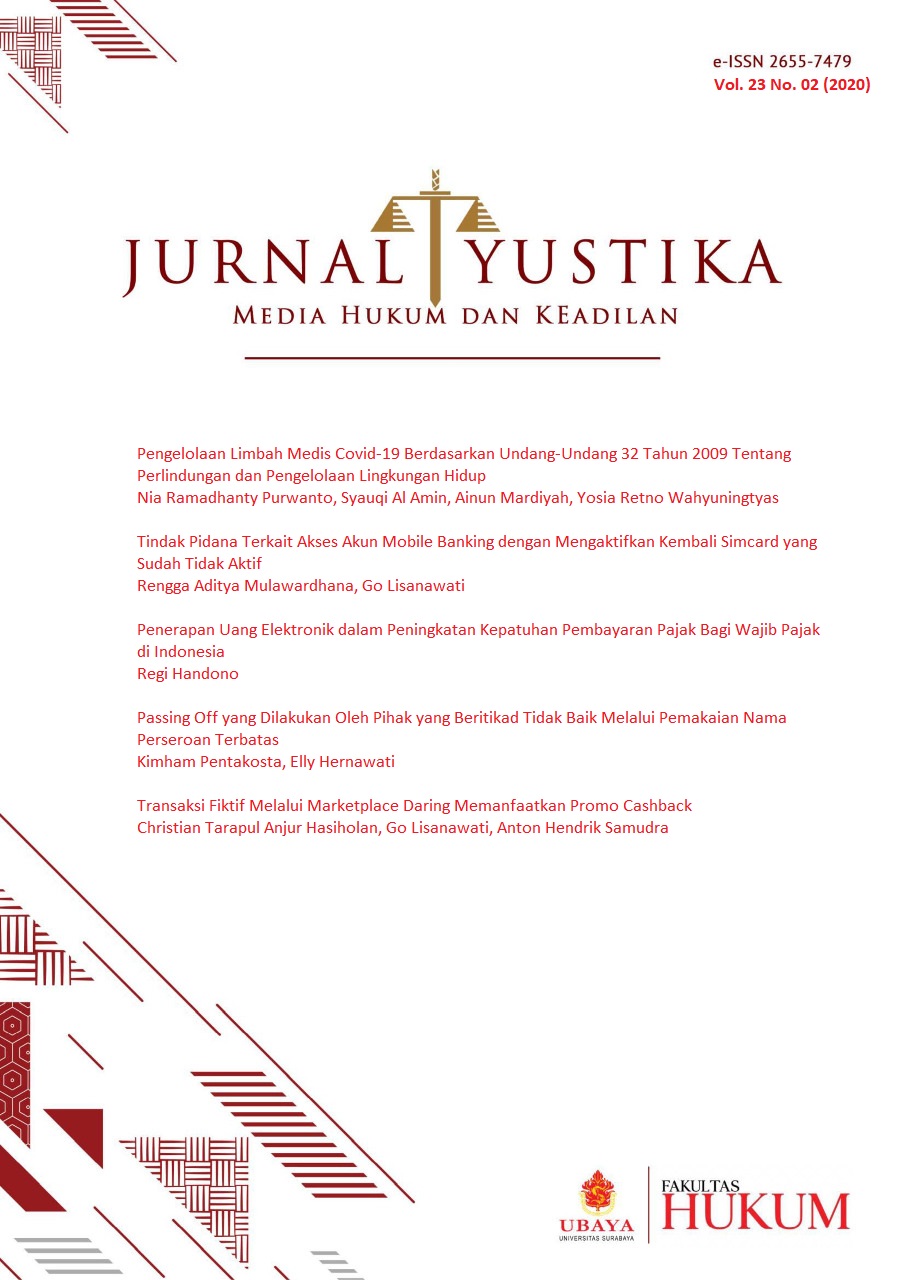Tindak Pidana Terkait Akses Akun Mobile Banking dengan Mengaktifkan Kembali Simcard yang Sudah Tidak Aktif
 Abstract Views:
788 times
Abstract Views:
788 times
 PDF Downloads:
1503 times
PDF Downloads:
1503 times
Abstract
Criminal activities related to the use of the internet (cyber crime) are growing rapidly in Indonesia with various modes. This article aims to analyze one of the cases that has occurred regarding illegal access to fund transfers based on normative juridical methods. The action being studied was access to a mobile bank account using an inactive card to transfer funds. Based on this mode, two violations occurred in 2 (two) laws as well as Law Number 11 of 2008 concerning Information and Electronic Transactions and Law Number 3 of 2011 concerning Fund Transfers. The result of this research is that perpetrators with mobile banking account access mode by using an inactive card and transferring funds can fulfill the criminal elements according to the provisions of Article 30 paragraph (3) of Law Number 11 of 2008 concerning Electronic Information and Transactions, and can subject to criminal penalties according to Article 46 paragraph (3) of Law Number 11 of 2008 concerning Electronic Information and Transactions, and also fulfills criminal elements according to the criminal provisions of Article 81 of Law Number 3 of 2011 concerning Fund Transfers.
Downloads
References
Buku
Arief, Barda Nawawi (2006). Tindak Pidana Mayantara. Jakarta: Raja Grafindo Persada.
Chazawi, Adami dan Ardi Ferdian (2011). Tindak Pidana Informasi & Transaksi Elektronik (Penyerangan Terhadap Kepentingan Hukum Pemanfaatan Teknologi Informasi dan Transaksi Elektronik). Malang: Banyumedia.
Hardinanto, Aris (2019).Akses Ilegal Dalam Perspektif Hukum Pidana. Malang: Setara Press.
Ibrahim, Johanes dan Yohanes Hermanto Sirait (2018).Kejahatan Transfer Dana: Evolusi dan Modus Kejahatan Melalui Sarana Lembaga Keuangan Bank. Jakarta: Sinar Grafika.
Indradi, Ade Ary Syam (2006). CARDING (Modus Operandi, Penyidikan, dan Penindakan). Jakarta: Pensil 324.
Moeljatno (2008). Asas-asas Hukum Pidana. Jakarta: Rineka Cipta.
Prasetyo, Teguh (2010). Hukum Pidana. Jakarta: Raja Grafindo Persada.
Riswandi, Budi Agus (2005). Aspek Hukum Internet Banking. Jakarta: Raja Grafindo Persada.
Samudra, Anton Hendrik and Julius, Andrian. (2017). Online Transaction Fraud Methods In Indonesia And The Norm Of Deterrence: The Challenges And Obstacles. In: Tackling Financial Crimes: Various International Perspectives. Genta Publishing, Yogyakarta, pp. 165-172. ISBN 978-602-1500-89-7
Sanusi, Arsyad (2011). Cyber Crime. Jakarta: Milestone.
Artikel Jurnal
Chintia, Ervina, et. al. (2018). Kasus Kejahatan Siber di Indonesia yang Paling Banyak Terjadi di Indonesia dan Penanganannya. JIEET, 02 (02), 65-69. doi: http://dx.doi.org/10.26740/jieet.v2n2.p65-69
Muhammad Khairul Faridi (2018). Kejahatan Siber dalam Bidang Perbankan. Cyber Security dan Forensik Digital, 1 (2). 57-61.
Nani Widya Sari (2018). Kejahatan Cyber Dalam Perkembangan Teknologi Informasi Berbasis Komputer. Jurnal Surya Kencana Dua: Dinamika Masalah Hukum dan Keadilan, 5(1), 577- 593. doi: http://dx.doi.org/10.32493/SKD.v5i2.y2018.2339.
Samudra, Anton Hendrik. (2019). Modus Operandi dan Problematika Penanggulangan Tindak Pidana Penipuan Daring, Mimbar Hukum, 31(1), 59-74, doi: https://doi.org/10.22146/jmh.34786
S., Anton Hendrik and Qisthi K., Nian (2018) Tightening Loose Ends in Eradicating Card Fraud (Reviewing card skimming case verdict in Denpasar, Indonesia). In: Proceedings of the Social and Humaniora Research Symposium (SoRes 2018). Advances in Social Science, Education and Humanities Research, 307 . Atlantis Press, pp. 588-593. ISBN 978-94-6252-693-8. Doi: https://doi.org/10.2991/sores-18.2019.134
Supanto (2016). Perkembangan Kejahatan Teknologi Informasi (Cyber Crime) dan Antisipasinya dengan Penal Policy. Yustisia, 5(1), 52-70. doi: https://doi.org/10.20961/yustisia.v5i1.8718.
Widianika Nurani, (2014). Tindak Pidana Transfer Dana Melalui Perintah Transfer Dana Palsu Yang Dilakukan Oleh Nasabah Pt Bank International Indonesia Tbk (Studi Putusan PN Surakarta Nomor: 108/Pid.SUS/2014/PN.Skt.). Recividive, 3(3), 356-363.
Artikel Internet
Jawa Pos (2019). Dua Pembobol Akun E-Banking Ditangkap. https://www.jawapos.com/nasional/hukum-kriminal/09/08/2019/duo-pembobol-akun-e-banking-ditangkap/. (Diakses pada 29 Desember 2019).
Bank Central Asia. (2020). https://www.bca.co.id/bcamobile (Diakses pada 20 Mei 2020).
Peraturan Perundang-Undangan
Undang-UndangDasar Negara Republik Indonesia Tahun 1945.
Kitab Undang-Undang Hukum Pidana.
Undang-Undang”Nomor 11 Tahun 2008 tentang Informasi dan Transaksi Elektronik.”
Undang-Undang”Nomor 19 Tahun 2016 tentang Perubahan atas Undang-Undang Nomor 11 Tahun 2008 tentang Informasi dan Transaksi Elektronik.”
Undang-Undang Nomor 3 Tahun 2011 tentang Transfer Dana.
Peraturan Pemerintah Republik Indonesia Nomor 71 Tahun 2019 tentang Penyelenggaraan Sistem dan Transaksi Elektronik.
Peraturan Menteri Komunikasi dan Informatika Republik Indonesia Nomor 11 Tahun 2018 tentang Penyelenggaraan Sertifikasi Elektronik

This work is licensed under a Creative Commons Attribution-ShareAlike 4.0 International License.
All articles published in YUSTIKA are licensed under a Creative Commons Attribution-ShareAlike 4.0 International (CC BY-SA) license. This means anyone is free to copy, transform, or redistribute articles for any lawful purpose in any medium, provided they give appropriate attribution to the original author(s) and YUSTIKA, link to the license, indicate if changes were made, and redistribute any derivative work under the same license.
Copyright on articles is retained by the respective author(s), without restrictions. A non-exclusive license is granted to YUSTIKA to publish the article and identify itself as its original publisher, along with the commercial right to include the article in a hardcopy issue for sale to libraries and individuals.
Although the conditions of the CC BY-SA license don't apply to authors (as the copyright holder of your article, you have no restrictions on your rights), by submitting to YUSTIKA, authors recognize the rights of readers, and must grant any third party the right to use their article to the extent provided by the license.

 DOI:
DOI:




.jpg)




